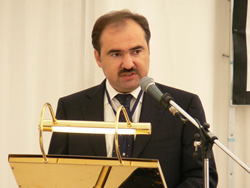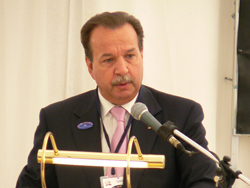 The 19th Baltic Social Security Conference was held in Svetlogorsk, the Kaliningrad region, on September 7-9, 2010. This international event provides a unique platform to statesmen, social security and pension insurance agency officials, scientists, researchers and representatives of regional and international organizations to discuss and analyze the role of social security in the public life and prospects for its development in the 21st century.
The 19th Baltic Social Security Conference was held in Svetlogorsk, the Kaliningrad region, on September 7-9, 2010. This international event provides a unique platform to statesmen, social security and pension insurance agency officials, scientists, researchers and representatives of regional and international organizations to discuss and analyze the role of social security in the public life and prospects for its development in the 21st century.
The conference was attended by representatives of social security agencies of Germany, Denmark, Norway, Sweden, Finland, Poland, Estonia, Latvia, Lithuania and Russia and experts of international organizations (the European Commission, the International Social Security Association, the International Labor Organization, etc.)
The main theme of the conference was “Pension systems’ development trajectories: maintaining public commitments”. The meetings highlighted the development of pension systems in the changing demographic context, minimal guarantees of pension benefits and state guarantees of long-term pension obligations.
The principal speaker of the 19th Baltic Social Security Conference was Chairman of the Board of the Pension Fund of the Russian Federation Anton Drozdov. His report emphasized the importance and the unconditional fulfillment of state commitments to upgrade pension benefits by the example of measures approved by the Russian government and enforced by PFR in 2009-2010.
The year 2010 began in Russia with valorization of pension rights, which was the first indexation of pensions in 2010. Pensions of 34 million pensioners were increased by an average of 1,090 rubles without their formal request, and 48% of pensioners received a supplement larger than 1,000 rubles.
Since April 1, social and state pensions and social benefits that grow alongside an increase of social pensions grew by 8.8%.
On April 1 labor pensions of Russians were increased by 6.3%. As a result, an average old age labor pension grew to 8,180 rubles. Alongside the increase of labor and social pensions, monthly benefits grew by 10% on April 1.
 On July 1 social pensions grew by additional 3.41% to an average amount of 4,757 rubles, and an average pension of persons with war disabilities and WWII veterans receiving two pensions amounted to approximately 19,200 rubles. The total indexation of social pensions in 2010 stood at 12.51%.
On July 1 social pensions grew by additional 3.41% to an average amount of 4,757 rubles, and an average pension of persons with war disabilities and WWII veterans receiving two pensions amounted to approximately 19,200 rubles. The total indexation of social pensions in 2010 stood at 12.51%.
Pensions of working pensioners were adjusted without their formal requests on August 1. As a result, pensions of 12.4 million working pensioners grew. In all, the indexation applied to 35.4% of recipients of labor pensions in Russia. An average monthly pension supplement achieved through the adjustment varied from 70 to 280 rubles depending on the pensioner’s wage and region of residence.
In addition to the traditional increase of social and labor pensions, social pension supplements were established on January 1, 2010, to harmonize pensions with the regional pensioner subsistence minimum. PFR pays federal social supplements in 66 constituent territories of the Russian Federation, and as of August 1 the payments were made to 2.5 million non-working pensioners. Regional supplements were paid by local social security bodies to 2.47 million pensioners in 18 regions.
Along the growth of pensions, the number of recipients of the federal social supplement to pensions has been reducing. The number of such pensioners reduced by 9% on April 1. The number of recipients will change again with the establishment of new pensioner subsistence minimums in 2011.
The Russian government plans to increase pensions consistent with the growth of consumer prices and PFR revenue by approximately 9% in 2011. The first indexation is planned for February 1, 2011.
The program of state co-funding of pensions – a unique chance to increase one’s future pension with the financial support of the government – has been in effect in Russia for three years. Whenever a citizen transfers from 2,000 to 12,000 rubles a year to the cumulative part of his or her pension, the government adds the same amount of money to his or her pension account. As of today, the program has been joined by almost 3 million Russians.
 The PFR head made the collection of insurance contribution a focus of his report. As known, since January 1, 2010, all Russian employers are paying insurance contributions directly to budgets of the Pension Fund and the Mandatory Health and Social Security Funds rather than paying a single social tax to the federal budget. The correctness of accrual and payment of mandatory pension and health insurance contributions is controlled by PFR and its territorial offices.
The PFR head made the collection of insurance contribution a focus of his report. As known, since January 1, 2010, all Russian employers are paying insurance contributions directly to budgets of the Pension Fund and the Mandatory Health and Social Security Funds rather than paying a single social tax to the federal budget. The correctness of accrual and payment of mandatory pension and health insurance contributions is controlled by PFR and its territorial offices.
As of August, the Pension Fund collected 910.7 billion rubles in mandatory pension insurance contributions, or 292.8 billion rubles more than in the relevant period of last year (total insurance contributions grew by 47.4%).
At the moment, PFR is planning its budget for 2011 and the projected period. The government approved the main parameters of the PFR budget for that period on July 29. They are based on the forecast of the Economic Development Ministry, a growth of the rate of mandatory pension insurance contributions and a plan of increasing pensions and benefits. For instance, PFR budget revenue is forecasted to reach 5.1 trillion rubles, including 4.69 trillion rubles in the unfunded part, in 2011, 5.59 trillion rubles, including 5.11 trillion rubles in the unfunded part, in 2012, and 6.14 trillion rubles, including 5.59 trillion rubles in the unfunded part, in 2013. The labor pension deficit will amount to 891 billion rubles in 2011, 980 billion rubles in 2012, and 1.1 trillion rubles in 2013.
